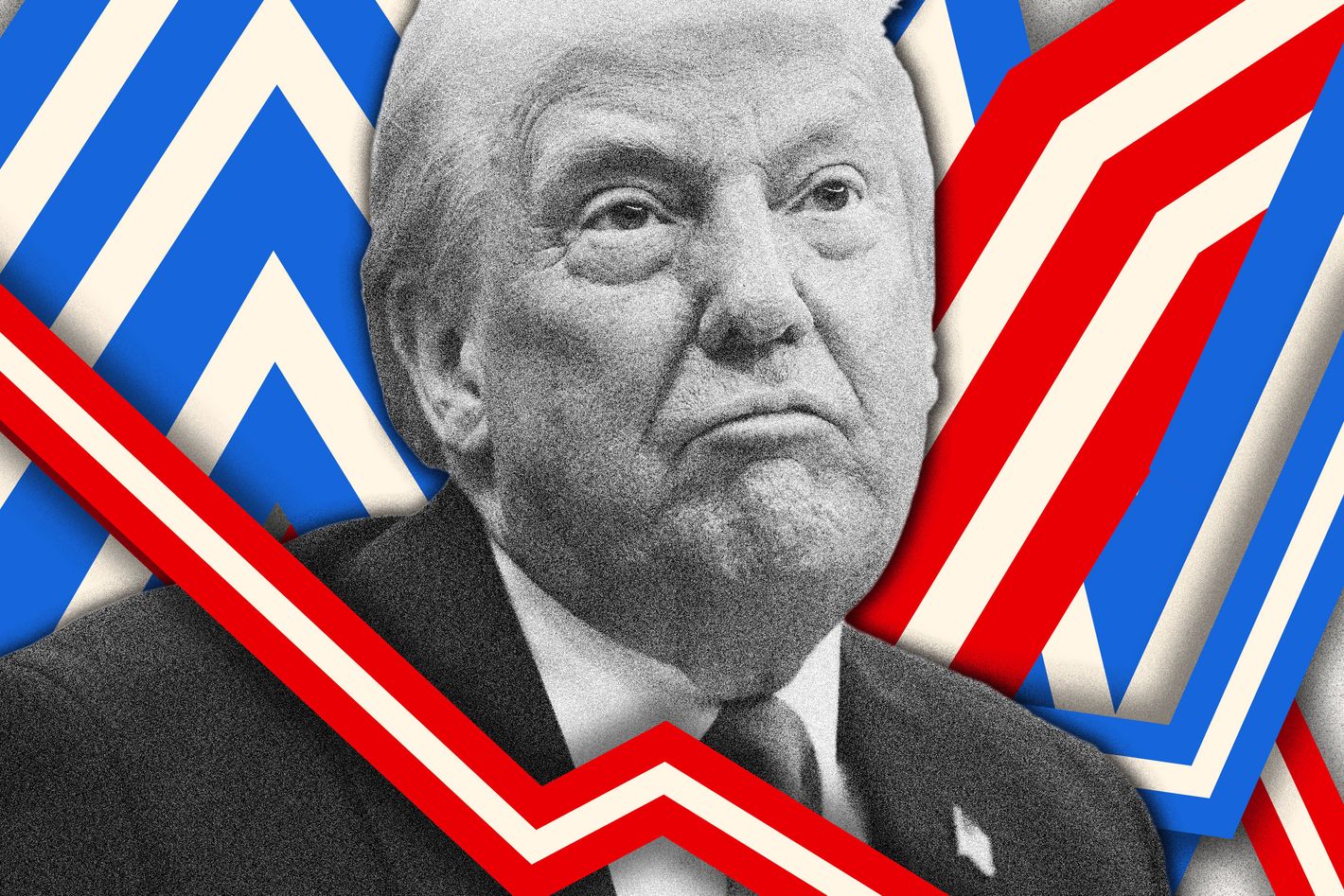Photo-Illustration: Intelligencer; Photo: Getty Images
Experts’ reactions to President Trump’s big new protectionist push have been mostly negative. From economists, judgments have largely ranged from skeptical to horrified. In the political realm, Democrats have been almost uniformly hostile, while Republicans have generally fallen silent or hoped for the best. From the generally Trump-aligned business community, the glass-half-empty opinion is that the president’s program is so obviously ill advised that he will eventually curtail or abandon it. The glass-half-empty faction is freaking out over its terrible mistake in assuming Trump didn’t mean what he said (over and over) about the need for high permanent tariffs until the end of time.
If Trump persists in this strategy to build a new Fortress America, the consequences for daily life in this country will determine whether it represents a political catastrophe of historic dimensions, a consolidation of MAGA policies, or something in between. But it’s worth taking a look at public opinion as it existed before “Liberation Day” to determine if the public is predisposed to support or oppose the new universal tariff program before the inevitable international backlash and domestic fallout are known.
First of all, Trump’s public standing generally (at least outside his GOP base) is mixed at best and slowly but steadily deteriorating. His job-approval average according to Silver Bulletin is currently at 46.6 percent positive and 49.9 percent negative, or a net minus-3.3 percent. When he began his second term, it was at 51.6 percent positive and 40 percent negative, or plus-11.6 percent. So that’s a 14.9 percent erosion of his popularity in just over ten weeks. Since Trump did not have (and did not pursue) any honeymoon with Democrats, and Republicans remain thrilled with him, much of this deterioration is with the independent voters who were crucial to the 47th president’s 2024 victory. An April 2 Reuters-Ipsos poll, for example, showed Trump deep underwater with independents for a job-approval ratio of 37 percent positive and 59 percent negative.
At a more general level than tariffs or trade policies, Trump’s job-performance ratings for handling the economy — by general assent the most important issue in 2024 — have been mediocre with ratings on prices and inflation coming in significantly lower. An April 1 Economist-YouGov survey showed a 45 percent to 48 percent approval ratio on Trump’s handling of “jobs and the economy,” which slipped to 40 percent to 53 percent on “inflation/prices.” A March 11 NBC News poll gave Trump a 44 percent/54 percent job performance rating on “the economy” and a 42 percent/55 percent rating on “inflation and the cost of living.” Most impressively, a March 31 CBS News survey showed 64 percent of Americans thought Trump’s focus on lowering prices was “not enough.”
Another potential danger sign on an issue adjacent to the economy has been the deteriorating popularity of DOGE leader Elon Musk, whose profile has become exceptionally high during the first weeks of the Trump administration. The April 2 Reuters-Ipsos survey assessed Musk’s job performance at 39 percent favorable and 57 percent unfavorable (with 43 percent very unfavorable). A March 27 Marquette Law School national poll showed Musk at 38 percent favorable and 60 percent unfavorable (with 46 percent very unfavorable). This is a growing problem for Trump.
Drilling down to public attitudes about Trump’s tariffs, the Washington Post has a good summary of recent data:
A CBS News-YouGov poll last week found 56 percent of Americans oppose “placing new tariffs on goods imported from other countries.” A Fox News poll in March found most registered voters supported tariffs on products from China (55 percent). But the same poll found most opposed tariffs on products from Mexico (56 percent) and Canada (61 percent).
A Post-Ipsos poll in February, the Fox poll and a Reuters/Ipsos poll all found about 7 in 10 saying tariffs will make products U.S. consumers buy more expensive.
The Fox poll and a separate Marquette poll found majorities saying that tariffs would hurt the U.S. economy. And the Post-Ipsos poll found more Americans saying tariffs would hurt rather than help both U.S. manufacturers and workers.
To be clear, these not-so-positive assessments are being measured before prices have risen on any of the items affected by Liberation Day. They do not suggest Americans expect a good outcome for Trump’s trade war. And unlike many other aspects of the economy, negative consequences from tariffs imposed by Trump personally with a blare of trumpets can’t and won’t be blamed on his predecessor. It’s his show now.

